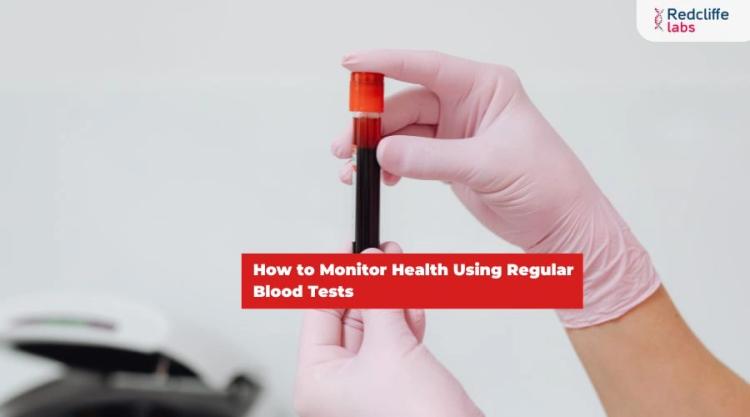Exploring Different Blood Tests For Skin Diseases – A Comprehensive Guide

Medically Reviewed By
Dr Divya Rohra
Written By Meenakshi
on May 19, 2023
Last Edit Made By Meenakshi
on Jan 9, 2025

Our skin, the body's largest organ, is a canvas that reveals varied health conditions lurking within. From common allergies to complex disorders, skin diseases pose many challenges, impacting millions of lives worldwide. Due to their diverse nature, overlapping symptoms, and wide range of causes, diagnosing skin diseases can be complex & challenging. Besides visual examination, family history & medical history, blood tests play a vital role in determining the underlying cause of the problem. In this blog, we’ll cover a variety of tests suggested by dermatologists depending on your condition, to diagnose skin diseases. Understanding these tests can help you get the right help, act early, and obtain treatment. So, let us highlight some significant blood tests for skin diseases.
Necessary Tests For Skin Diseases:
Complete Blood Count (CBC) Test: While a CBC Test, also called FBC Test or Full Blood Count Test, may not directly diagnose a specific skin disease or disorder, abnormalities in these blood counts can indicate a condition contributing to skin issues. It evaluates RBCs, WBCs & Platelets. If any fluctuations or abnormalities are found, it suggests inflammation or infection related to the skin.
Pros Of CBC Test:
- Identify potential factors or underlying causes contributing to skin diseases.
- Detect abnormalities in blood cells & platelets associated with skin disorders.
- Monitor the skin disease progression or monitor the treatment’s response.
AEC Test: Elevated eosinophil levels often indicate the presence of allergic skin diseases, making the Absolute Eosinophil Count Test crucial for providing valuable insights into your skin health. It is not a definitive test of skin diseases but helps healthcare providers unravel the mysteries contributing to skin diseases and what can be done to stop or manage them in time.
Pros Of Absolute Eosinophil Count Test:
- Identify allergic skin diseases.
- Indicate the severity of the allergic reactions.
- Help plan treatment to manage skin conditions.
Immunoglobulin E (IgE) Test: When diagnosing skin diseases, Immunoglobulin E (IgE) Test can help. It identifies specific allergens responsible for causing or exacerbating skin diseases and helps healthcare providers plan, prescribe the correct course of treatment & monitor the effectiveness of the treatment.
Pros Of Immunoglobulin E (IgE) Test:
- Identify specific allergens contributing to skin diseases.
- Improve allergic skin disease management.
- Guides dermatologists provide treatment based on the identified allergens.
Patch Tests: Another significant test, the Patch Skin Test, helps identify allergic contact dermatitis triggers with suspected skin diseases caused due to allergens. It checks for specific substances that may be causing or exacerbating different skin conditions, allowing for targeted treatment and effective control of the damage.
Pros Of Patch Tests:
- Determine the substance causing skin diseases.
- Help prevent future triggers.
- Guide lifestyle modification, preventive measures & treatments.
Read our other blog on Blood tests for Diabetes - https://redcliffelabs.com/myhealth/diabetes/understanding-the-different-blood-tests-for-diabetes/
Allergy Profile Test: As a comprehensive package, it includes a variety of blood tests to assess specific antibodies associated with different allergens. The test identifies allergens causing skin problems, helps doctors guide treatment & monitor the condition over time.
Pros Of Allergy Profile Test:
- Identify allergens contributing to allergic skin diseases.
- Provide a broader & better understanding of skin conditions.
- Check the progression of skin allergies.
- Facilitate treatment to get control of the condition.
- Help monitor the effectiveness of the treatment.
Microbiological Analysis: This blood test looks for the presence of microorganisms, such as bacteria, viruses, or fungi, that contributes to different skin conditions. It helps identify the cause of skin conditions, enabling healthcare practitioners to initiate the appropriate antimicrobial treatment to manage the disease progression better.
Pros Of Microbiological Analysis:
- Identify causative agents contributing to the infection or inflammation.
- Help differentiate infectious and non-infectious skin diseases.
- Detect antimicrobial resistance if present.
- Allow implementation of control measures to minimize the spread of contagious skin diseases.
Histopathological Examinations: This test checks for the presence of microorganisms, abnormal cell growth & inflammatory processes to determine the underlying cause of varied skin diseases, including skin cancers, autoimmune disorders, or infections. It identifies the characteristics or nature of the skin disease for better management.
Pros Of Histopathological Examinations:
- Help evaluate skin tissue samples at a microscopic level.
- Check specific cellular and tissue changes linked to different skin diseases.
- Help identify rare or uncommon skin disorders.
- Monitor disease progression and evaluate the effectiveness of treatment.
The type of diagnosis or test depends on your conditions, symptoms, age, physical examination & other factors. However, each test is crucial for a detailed evaluation of your skin condition, understanding the underlying problems & taking necessary measures to avoid complications.
Role Of Early Diagnosis Of Skin Diseases For Better Management:
Early diagnosis helps identify factors causing skin issues, allows timely initiation of the appropriate treatment, prevents complications & aids with disease management planning. Diagnostic tests, including blood tests, are significant in identifying the cause contributing to it and providing appropriate treatment. A timely diagnosis and treatment can prevent the progression of the disease and complications associated with the condition. Your skin acts as the first line of defense against harmful microbes; therefore, keeping it protected is essential to maintain good skin health.
For reliable and comprehensive blood tests for skin diseases, consider choosing Redcliffe Labs, your preferred Omnichannel Pan India Diagnostic Service Provider. We offer a wide range of tests at competitive market prices, empowering you to get control over the condition, avoid complications and improve skin health.
Leave a comment
3 Comments
rachel brown
May 24, 2024 at 6:54 AM.
My mum who is 84, has had a skin condition her whole life that has never been able to be diagnosed. It is dry and constantly shedding I was hoping you may be able to help as I don't know where to start , regards Rachel
MyHealth Team
May 24, 2024 at 12:32 PM.
Hi Rachel, Since it's been persistent, we Would recommend consulting a dermatologist specializing in challenging cases. They can conduct tests and provide tailored treatment options. In the meantime, gentle skincare routines with moisturizing products might offer some relief. Best wishes to you and your mom in finding answers and relief.
HABIB HOSSAIN BAIDYA
Oct 12, 2023 at 5:50 AM.
1. tinaea corporis 2. psoroasis 2. enzema medicine and blood test
Myhealth Team
Oct 13, 2023 at 10:53 AM.
For conditions like tinea corporis, psoriasis, and eczema, consult a doctor for diagnosis and treatment. Medications and blood tests will depend on the specific condition and individual health.
Sharda Malpani
Sep 24, 2023 at 4:32 AM.
What are the suggestive tests for finding problem of skin disease.
Myhealth Team
Sep 26, 2023 at 1:28 PM.
To diagnose a skin disease, common tests include: 1. Physical examination. 2. Skin biopsy. 3. Blood tests. 4. Culture/swab tests. 5. Patch testing. 6. Dermoscopy. 7. Skin scraping. 8. Wood's lamp examination. 9. Skin allergy testing. 10. Molecular testing (if necessary). Consult a dermatologist for the most suitable tests based on your symptoms.



